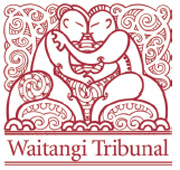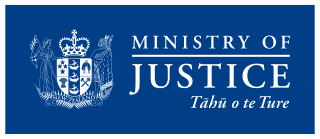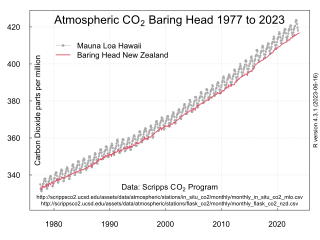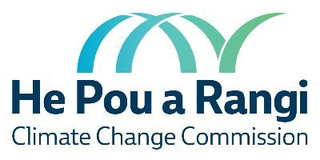Related Research Articles

The Waitangi Tribunal is a New Zealand permanent commission of inquiry established under the Treaty of Waitangi Act 1975. It is charged with investigating and making recommendations on claims brought by Māori relating to actions or omissions of the Crown, in the period largely since 1840, that breach the promises made in the Treaty of Waitangi. The Tribunal is not a court of law; therefore, the Tribunal's recommendations and findings are not binding on the Crown. They are sometimes not acted on, for instance in the foreshore and seabed dispute.

The Resource Management Act (RMA) passed in 1991 in New Zealand is a significant, and at times, controversial Act of Parliament. The RMA promotes the sustainable management of natural and physical resources such as land, air and water. New Zealand's Ministry for the Environment describes the RMA as New Zealand's principal legislation for environmental management.
The Ministry for the Environment is the public service department of New Zealand charged with advising the New Zealand Government on policies and issues affecting the environment, in addition to the relevant environmental laws and standards. The Environment Act 1986 is the statute that establishes the Ministry.
Russell McVeagh is a New Zealand law firm with offices in Auckland and Wellington. It is one of New Zealand's largest law firms and is ranked highly by law firm ranking guides such as The Legal 500 and Chambers and Partners.

Tort reform consists of changes in the civil justice system in common law countries that aim to reduce the ability of plaintiffs to bring tort litigation or to reduce damages they can receive. Such changes are generally justified under the grounds that litigation is an inefficient means to compensate plaintiffs; that tort law permits frivolous or otherwise undesirable litigation to crowd the court system; or that the fear of litigation can serve to curtail innovation, raise the cost of consumer goods or insurance premiums for suppliers of services, and increase legal costs for businesses. Tort reform has primarily been prominent in common law jurisdictions, where criticism of judge-made rules regarding tort actions manifests in calls for statutory reform by the legislature.

Carbon pricing is a method for governments to mitigate climate change, in which a monetary cost is applied to greenhouse gas emissions. This is done to encourage polluters to reduce fossil fuel combustion, the main driver of climate change. A carbon price usually takes the form of a carbon tax, or an emissions trading scheme (ETS) that requires firms to purchase allowances to emit. The method is widely agreed to be an efficient policy for reducing greenhouse gas emissions. Carbon pricing seeks to address the economic problem that emissions of CO2 and other greenhouse gases are a negative externality – a detrimental product that is not charged for by any market.

The Ministry of Justice is an executive department of the New Zealand Government, responsible for supporting the judiciary and the administration of justice within New Zealand. It develops justice policy and provides advice to ministers, Cabinet, and other justice sector agencies. Its main functions are to help reduce crime and build safer communities; increase trust in the justice system; and maintain the integrity of New Zealand's constitutional arrangements.

Carbon emission trading (also called carbon market, emission trading scheme (ETS) or cap and trade) is a type of emissions trading scheme designed for carbon dioxide (CO2) and other greenhouse gases (GHGs). A form of carbon pricing, its purpose is to limit climate change by creating a market with limited allowances for emissions. Carbon emissions trading is a common method that countries use to attempt to meet their pledges under the Paris Agreement, with schemes operational in China, the European Union, and other countries.

Climate change in New Zealand involves historical, current and future changes in the climate of New Zealand; and New Zealand's contribution and response to global climate change. Summers are becoming longer and hotter, and some glaciers have melted completely and others have shrunk. In 2021, the Ministry for the Environment estimated that New Zealand's gross emissions were 0.17% of the world's total gross greenhouse gas emissions. However, on a per capita basis, New Zealand is a significant emitter, the sixth highest within the Annex I countries, whereas on absolute gross emissions New Zealand is ranked as the 24th highest emitter.
The New Zealand Climate Science Coalition was a anthropogenic climate change denial organisation in New Zealand, formed in 2006 with aim of "refuting what it believes were unfounded claims about anthropogenic global warming". The Coalition came to prominence in 2010 when it challenged the methodology and accuracy of NIWA's historical temperature records in court. The Coalition lost the case, could not afford to pay costs awarded against it and was forced into liquidation. There is an unrelated website called the New Zealand Climate Science Coalition which is an American blog also written by climate change deniers. The American website links to a different URL to the original URL associated with the New Zealand website which no longer exists.

Roderick Marshall Carr is a New Zealand businessman and administrator. He retired from his position as Vice-Chancellor of the University of Canterbury in 2019 and has been a chairman of the board of the Reserve Bank of New Zealand, and a director of Lyttelton Port Company, Taranaki Investment Management and Canterbury Employers’ Chamber of Commerce. In 2019, Carr was appointed as Chair-designate for the Climate Change Commission and has been confirmed in that role for five years following the passing of the Climate Change Response Amendment Act. Carr has been partially sighted and legally blind since birth.

Climate change is leading to long-term impacts on agriculture in Germany, more intense heatwaves and coldwaves, flash and coastal flooding, and reduced water availability. Debates over how to address these long-term challenges caused by climate change have also sparked changes in the energy sector and in mitigation strategies. Germany's energiewende has been a significant political issue in German politics that has made coalition talks difficult for Angela Merkel's CDU.

Climate change litigation, also known as climate litigation, is an emerging body of environmental law using legal practice to set case law precedent to further climate change mitigation efforts from public institutions, such as governments and companies. In the face of slow climate change politics delaying climate change mitigation, activists and lawyers have increased efforts to use national and international judiciary systems to advance the effort. Climate litigation typically engages in one of five types of legal claims: Constitutional law, administrative law, private law (challenging corporations or other organizations for negligence, nuisance, etc., fraud or consumer protection, or human rights.

State of the Netherlands v Urgenda Foundation (2019) is climate change litigation heard by the Supreme Court of the Netherlands related to government efforts to curtail carbon dioxide emissions. The case was brought against the Dutch government in 2013, arguing the government, by not meeting a minimum carbon dioxide emission-reduction goal established by scientists to avert harmful climate change, was endangering the human rights of Dutch citizens as set by national and European Union laws.

The Climate Change Commission is an independent Crown entity that advises the New Zealand Government on climate change policy and monitors the government's progress towards New Zealand's emission reduction goals within the framework of the Climate Change Response Amendment Act. The Commission was established as the successor to the Interim Climate Change Committee following the passage of the Zero Carbon Act in November 2019.

Executive Order 13990, officially titled Protecting Public Health and the Environment and Restoring Science to Tackle the Climate Crisis is an executive order signed by President Joe Biden on January 20, 2021, which implements various environmental policies of his administration including revoking the permit for the Keystone XL Pipeline and temporarily prohibiting drilling in the arctic refuge.
Tessa Khan is an environmental lawyer who lives in the United Kingdom. She co-founded and is co-director of the Climate Litigation Network, which supports legal cases related to climate change mitigation and climate justice.
West Virginia v. Environmental Protection Agency, 597 U.S. 697 (2022), is a landmark decision of the U.S. Supreme Court relating to the Clean Air Act, and the extent to which the Environmental Protection Agency (EPA) can regulate carbon dioxide emissions related to climate change.

Susan Jane Grey is a political figure and environmental lawyer in Nelson, New Zealand. She is the co-leader of the NZ Outdoors & Freedom Party and of Freedoms NZ. She is known for promoting medicinal cannabis rights and opposing COVID-19 vaccination, 5G technology, and the use of 1080, frequently sharing misinformation on social media about the effectiveness of COVID vaccination.
Anjali Sharma is an Australian climate activist, who at the age of 16, was the lead litigant in a class action in the Australian Federal Court, against the Federal government, and in particular, the then Minister for the Environment, Sussan Ley, for failing to consider the impacts of climate change. Sharma was also a finalist in the 2021 Children's Climate Prize, an International prize for climate activism, based in Sweden.
References
- 1 2 3 "About Us". Lawyers for Climate Action NZ Inc. Retrieved 23 May 2023.
- 1 2 "News & Events". Lawyers for Climate Action NZ Inc. 8 August 2019. Retrieved 23 May 2023.
- ↑ Corlett, Eva (2 July 2021). "New Zealand lawyers sue climate change body over alleged failure to meet targets". The Guardian. ISSN 0261-3077 . Retrieved 23 May 2023.
- 1 2 3 Green, Kate (23 November 2022). "High Court rules against climate change action case over commission's advice to government". RNZ. Retrieved 23 May 2023.
- 1 2 Dobson, Jamie (2021). "The right to a sustainable environment" (PDF). LawTalk (945): 6–8 – via New Zealand Law Society.
- 1 2 3 Cooper, Nathan (13 December 2021). "Courts around the world have made strong climate rulings – not so in New Zealand". The Conversation. Retrieved 23 May 2023.
- 1 2 "Australian and Pacific Climate Change Litigation". law.app.unimelb.edu.au. 2021. Retrieved 23 May 2023.
- ↑ Ewing, Isobel (23 November 2022). "High Court judge agrees with group that New Zealand's climate change law lags behind global targets". Newshub. Retrieved 23 May 2023.
- ↑ "Judicial review of Climate Change Commission and Minister of Climate Change". Ministry for the Environment. 23 November 2022. Retrieved 23 May 2023.
- 1 2 Stevens, Ric (23 May 2023). "Lawyers seeking steeper emissions cuts lose court bid". NZ Herald. Retrieved 23 May 2023.
- 1 2 Wannan, Olivia (22 March 2023). "Climate Change Commission fails to get costs back from activist group". Stuff. Retrieved 23 May 2023.
- ↑ Or, Mary (13 May 2023). "Lawyers for Climate Action NZ questions climate change regulations before High Court". www.thelawyermag.com. Retrieved 23 May 2023.
- 1 2 Daalder, Marc (21 February 2023). "Climate commission seeks $130k from activists". Newsroom. Retrieved 23 May 2023.